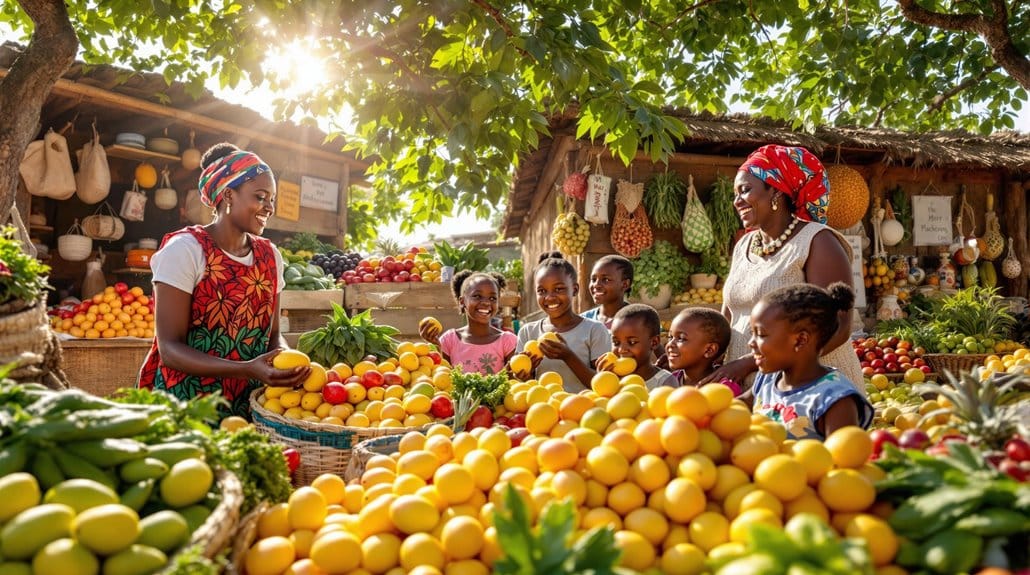Sustainable food experiences in Kenya center on community engagement, indigenous vegetables, and innovative farming practices. You'll discover how local crops, rich in nutrition, support healthier diets while enhancing food security. By adopting agroecological methods, farmers improve soil health and utilize drought-resistant varieties, making agriculture more resilient to climate change. Community initiatives empower youth and promote collaboration among stakeholders, aiming for a more equitable food system. Explore how these efforts are linked to national policies that prioritize sustainability and nutrition. There's so much more to uncover about the vibrant and evolving food landscape in Kenya.
Key Takeaways
- Indigenous vegetable markets offer a unique dining experience, showcasing local produce and promoting sustainable agricultural practices in communities across Kenya.
- Agroecological farms provide immersive tours and workshops, allowing visitors to learn about organic farming and the importance of biodiversity.
- Community-supported agriculture (CSA) initiatives connect consumers directly with local farmers, enhancing food security and promoting sustainable food sourcing.
- Farm-to-table restaurants emphasize seasonal, locally sourced ingredients, highlighting traditional Kenyan dishes made with indigenous vegetables for a sustainable dining experience.
- Culinary festivals celebrating local cuisine feature indigenous vegetables, promoting nutritional awareness while supporting local farmers and sustainable practices.
Importance of Indigenous Vegetables
As you explore the culinary landscape of Kenya, you'll find that indigenous vegetables play an essential role in enhancing both nutrition and sustainability.
These leafy vegetables boast higher nutritional profiles than conventional crops, providing crucial vitamins and minerals that contribute to better health outcomes. By incorporating indigenous vegetables into local diets, you're not just enjoying diverse flavors; you're also supporting sustainable food systems that promote food security and nutrition while reducing reliance on resource-intensive crops.
The government has considered mandating the blending of staple foods with these vegetables to enhance dietary diversity, reflecting a commitment to improving public health.
Additionally, processing methods like drying and fermenting not only extend the shelf life of indigenous vegetables but also create new market opportunities, minimizing food waste and fostering economic resilience.
To build consumer trust and demand, a proposed multi-dimensional labeling system for indigenous vegetables could further support local farmers and strengthen the indigenous vegetable value chain.
Sustainable Agricultural Practices
Sustainable agricultural practices in Kenya are transforming the way food is produced, ensuring that farming not only meets current needs but also protects resources for future generations. By adopting agroecological methods, you're enhancing soil health and improving biodiversity through techniques like crop rotation and utilizing drought-resistant varieties. This approach is essential for bolstering food security in a country facing climate challenges.
Local farmers are increasingly turning to organic farming practices, supported by training programs aimed at reducing reliance on synthetic inputs. You might find it inspiring that mobile technology and precision agriculture tools are helping farmers optimize resource use and improve market access, making decision-making more efficient.
However, the journey isn't without obstacles. Limited access to finance for smallholder farmers and inadequate infrastructure can hinder the widespread adoption of these sustainable agricultural practices.
Yet, initiatives like the National Agricultural Sector Climate Change Action Plan show the government's commitment to investing in irrigation infrastructure, enhancing water availability for sustainable food production. By engaging with these practices, you're not just contributing to a healthier planet; you're also nurturing your community's resilience and future.
Community Engagement in Food Systems
Engaging communities in Kenya's food systems has proven essential for enhancing local food security and resilience. Through initiatives like the establishment of 10 Community Seed Banks (CSBs), over 50 varieties of traditional leafy vegetables, legumes, and cereals are being conserved and distributed. This not only supports local agriculture but also enriches dietary diversity in the community.
The Training of Trainers (ToT) model empowers farmers by facilitating peer-to-peer learning, promoting regenerative agriculture and organic farming techniques. When farmers collaborate through multi-stakeholder platforms, they advocate for policies that bolster indigenous vegetable value chains, creating a stronger network among farmers, seed producers, and consumers.
Additionally, community-driven nutrition education sessions in urban areas foster active participation, allowing you to take ownership of food system interventions.
Projects like HealthyFoodAfrica highlight the importance of tailoring these interventions to meet specific community needs, improving both nutrition outcomes and resilience against climate shocks.
Nutritional Benefits of Local Foods
Harnessing the power of indigenous vegetables can greatly enhance your diet and overall health. These local foods, particularly traditional leafy vegetables (TLVs), offer a nutritional profile that surpasses many conventional crops. You'll find that they're packed with essential vitamins and minerals, vital for maintaining a healthy lifestyle.
By incorporating these vegetables into your meals, you can achieve improved dietary diversity. Research has shown that women participating in interventions increased their dietary diversity from 41.3% to 51.3%, highlighting the positive impact of local foods.
Moreover, African Leafy Vegetables (ALVs) are rich in antioxidants and phytochemicals, which can help reduce the risk of chronic diseases. When you choose to promote indigenous vegetables, you're not only benefiting your health but also supporting sustainable food systems.
These crops require fewer resources and have a lower environmental impact, making your choices more eco-friendly. Increased consumption of diverse local foods, especially among vulnerable populations like women and children under five, can lead to enhanced overall health outcomes.
Embracing these nutritional treasures can create a sense of belonging and connection to your community while fostering a healthier future.
Challenges in Food Production
If you look closely at Kenya's food production landscape, you'll see that limited financial access and infrastructure deficiencies are major hurdles.
Many smallholder farmers struggle to secure funding for sustainable practices, which stifles their productivity and innovation.
Additionally, inadequate roads and storage facilities lead to significant post-harvest losses, threatening the stability of the food supply.
Limited Financial Access
Limited financial access poses a significant challenge for smallholder farmers in Kenya, directly impacting their ability to adopt sustainable agricultural practices.
With around 40% of the population facing food insecurity, many farmers struggle to invest in necessary resources and technologies that could enhance productivity and resilience within the sustainable food system.
You might find it disheartening that high certification costs and stricter safety standards often limit smallholder farmers' access to more lucrative markets.
Despite agriculture contributing 33% to Kenya's GDP, the financial barriers faced by rural households—75% of whom depend on farming for their livelihoods—are significant.
Moreover, inadequate infrastructure compounds these issues, leading to post-harvest losses that further reduce income potential.
This cycle of limited financial access not only hinders farmers' ability to thrive but also impacts the overall sustainability of food production in the country.
As you explore sustainable food experiences in Kenya, it's crucial to recognize that empowering smallholder farmers with better financial access is key to creating a resilient agricultural landscape that can support both farmers and the communities they serve.
Infrastructure Deficiencies
Financial constraints aren't the only hurdles smallholder farmers in Kenya face; inadequate infrastructure considerably undermines their efforts in food production. The lack of solid infrastructure leads to staggering post-harvest losses, with up to 30% of agricultural produce wasted due to poor storage and transportation facilities. This situation affects not just farmers but everyone who relies on food availability.
Here are three key infrastructure deficiencies impacting food production:
- Transport Networks: Limited access to reliable roads makes it difficult for farmers to reach markets, contributing to market volatility and diminishing their income.
- Storage Facilities: Inadequate storage options result in substantial food wastage, further exacerbating food insecurity for the 40% of Kenyans who struggle to access enough food.
- Irrigation Systems: Insufficient irrigation limits water availability, which is vital for maintaining crop yields, especially under climate variability.
These infrastructure deficiencies not only stifle economic growth in the agricultural sector, which contributes 33% to Kenya's GDP, but also hinder sustainable practices.
Addressing these challenges is essential for creating food security and fostering a thriving community.
Youth Empowerment in Agriculture
In Kenya, you'll find that rural youth are stepping up as key players in agriculture, embracing innovative practices that can transform their communities.
Through targeted training and peer support, they're not just enhancing their farming techniques but also developing essential leadership skills that empower them to lead community initiatives.
This shift isn't just about farming; it's about building a sustainable future where young voices shape the agricultural landscape.
Innovative Practices Adoption
Youth empowerment in agriculture is transforming Kenya's rural landscape, where innovative practices are taking root among aspiring young farmers. This shift is essential for fostering sustainable food systems and enhancing food security.
By providing tools, guidance, and opportunities, young farmers are embracing new methods that promote resilience and efficiency.
Here are three key innovative practices these young farmers are adopting:
- Regenerative Agriculture: Through the Training of Trainers (ToT) model, over 1,000 farmers are learning to use regenerative techniques that restore soil health.
- Digital Solutions: Access to digital agricultural solutions helps improve productivity, enabling you to make data-driven decisions for better crop management.
- Community Engagement: Participation in community-driven projects allows you to collaborate and share knowledge, leading to increased crop yields and reduced reliance on synthetic inputs.
These innovative practices not only empower youth but also enhance their role in transforming local food systems.
As you engage in these initiatives, you're not just improving your own farming methods; you're contributing to a larger movement toward sustainable agriculture that benefits your community and the environment.
Leadership Skills Development
As innovative practices take root among young farmers, the development of leadership skills becomes increasingly crucial to their success and the sustainability of agriculture in Kenya. By engaging in community projects, you not only enhance your farming capabilities but also foster leadership qualities that empower you to make a difference. Through initiatives involving Community Health Promoters (CHPs), you gain insights into regenerative agriculture and organic farming techniques that can elevate both crop yields and community welfare.
| Leadership Skills | Impact on Agriculture |
|---|---|
| Effective communication | Enhances knowledge sharing among peers |
| Problem-solving | Leads to innovative farming solutions |
| Teamwork and collaboration | Strengthens community engagement |
With over 1,000 farmers benefiting from peer-to-peer learning, the Training of Trainers (ToT) model plays a significant role in your development. It guarantees that you're equipped to tackle challenges faced in the agricultural sector. By embracing these leadership skills, you're not only securing a sustainable future for yourself but also contributing to the overall food security of your community. Your growth is essential for a thriving agricultural landscape in Kenya.
Policy Framework for Sustainability
A robust policy framework is essential for fostering sustainable food experiences in Kenya.
It's vital that you understand how various policies integrate to support food production and enhance community resilience. Here are three key components:
- National Agricultural Sector Climate Change Action Plan: This initiative promotes sustainable agricultural practices, helping farmers adapt to changing climate conditions while ensuring food security.
- Vihiga County Nutrition Policy: This policy intertwines nutrition-sensitive agriculture with local governance, focusing on improving dietary outcomes and enhancing food security across communities.
- Support for Agroecological Practices: By providing subsidies for organic inputs and establishing regulatory frameworks, the government encourages farmers to adopt sustainable farming methods that strengthen local value chains.
Together, these policies aim to create an equitable food system, as outlined in the Kenyan Food System Vision post-Food System Summit 2021.
They emphasize the need for collaborative efforts among stakeholders to enhance indigenous vegetable value chains.
Through these initiatives, you're not just witnessing a shift in food production; you're part of a movement that prioritizes sustainability, community health, and resilience for future generations.
Innovative Processing Techniques
Building on the foundation laid by supportive policies, innovative processing techniques are transforming the landscape of food sustainability in Kenya. By employing methods like drying and fermenting indigenous vegetables, producers aren't only extending shelf life but also creating new market opportunities.
Take MACE Foods, for example; their supply of dried indigenous vegetables to supermarkets enhances availability and reduces waste in food systems. This approach addresses the short shelf life of leafy greens, making them more accessible for diverse consumption.
Moreover, these processing methods greatly boost the nutritional profiles of fresh produce, contributing to healthier diets for everyone. When you choose value-added products, you're not just enjoying tastier options; you're also supporting food security and sustainability. Increased processing of indigenous vegetables helps mitigate challenges like food spoilage, ensuring that nutritious food reaches those in need.
Collaboration with stakeholders, including farmers and seed producers, is essential to advance these techniques. By working together, we can strengthen the value chains of indigenous vegetables, fostering a community that values sustainability while enjoying the rich flavors of Kenya's heritage.
Embrace these innovations, and be part of a movement towards a healthier, more sustainable future.
Collaborative Stakeholder Efforts
Collaboration among stakeholders frequently transforms the landscape of food sustainability in Kenya, creating a robust network that integrates indigenous vegetables into local food systems. Through collaborative efforts, various players come together, enhancing both the availability and recognition of these essential resources.
Here's how you can see this in action:
- Multi-Stakeholder Partnerships: Farmers, seed producers, supermarkets, and policymakers unite to advance indigenous vegetable value chains.
- Community Engagement: Local communities actively participate in discussions, fostering awareness and promoting sustainable agricultural practices.
- Policy Influence: Recent workshops have focused on developing government guidelines that blend staple foods with indigenous vegetables, showcasing the power of stakeholder engagement in shaping policy.
These initiatives, such as the Sustainable Agrifood Systems Strategies (SASS) project in Nakuru, emphasize the importance of social, economic, and environmental sustainability.
Future of Food Security in Kenya
As you consider the future of food security in Kenya, it's clear that climate resilience strategies and innovative agricultural practices are essential.
The government's focus on sustainable practices will play an important role in overcoming the challenges posed by climate change.
Climate Resilience Strategies
In Kenya, addressing the challenges posed by climate change is essential for guaranteeing future food security. With 40% of the population facing food insecurity, implementing effective climate resilience strategies is critical.
Here are three key approaches you can engage with:
- Promoting Drought-Resistant Crops: By adopting drought-resistant varieties, you can help enhance crop yields and guarantee diverse diets, important for nutrition.
- Investing in Irrigation Infrastructure: The National Agricultural Sector Climate Change Action Plan emphasizes the need for sustainable irrigation systems, enabling farmers to better manage water resources.
- Utilizing Technology: Embracing mobile technology and precision agriculture tools allows for smarter decision-making, optimizing resource use and increasing resilience to climate shocks.
These strategies not only support individual farmers but also foster community-driven approaches that strengthen food systems.
By participating in multi-stakeholder partnerships, you can contribute to initiatives aimed at improving food security, especially in urban informal settlements.
Together, we can build a resilient future, guaranteeing that everyone has access to sustainable food experiences in Kenya.
Innovative Agricultural Practices
Innovative agricultural practices are transforming the landscape of food security in Kenya, providing farmers with the tools they need to thrive in a changing climate. By embracing agroecological methods, you can enhance soil health and biodiversity while adapting to climate variability. Drought-resistant crop varieties are becoming vital, helping you tackle the challenges posed by climate change and ensuring consistent yields.
Moreover, training programs focused on organic farming techniques empower you to create healthier diets and reduce dependence on synthetic inputs. These initiatives foster a sense of community among farmers, as you share knowledge and resources to build a more sustainable food system.
Technology also plays a key role in this transformation. Mobile apps and precision agriculture tools help you optimize resources, improve market access, and manage pests effectively, ultimately enhancing productivity.
The Kenyan government supports these efforts through the National Agricultural Sector Climate Change Action Plan, investing in irrigation infrastructure to improve water availability.
Frequently Asked Questions
What Is the Sustainable Food System in Kenya?
In Kenya, a sustainable food system emphasizes local sourcing and food sovereignty, ensuring communities have control over their food production.
You'll find that farmers are adopting agroecological methods and drought-resistant crops to enhance resilience against climate change.
These practices not only boost local economies but also improve food security.
What Is an Example of Sustainability in Food?
An example of sustainability in food is local sourcing combined with community gardens. By sourcing ingredients from nearby farms, you support local economies and reduce carbon footprints.
Community gardens foster connections among neighbors, encouraging shared responsibility for growing food. You'll find diverse crops flourish in these spaces, promoting biodiversity and enhancing nutrition.
Engaging in this practice not only nurtures your community but also cultivates a sense of belonging and pride in sustainable living.
What Is the Food Situation in Kenya?
The food situation in Kenya's complex, with around 40% of the population facing food insecurity.
You'll find that local cuisine reflects the agricultural challenges, relying heavily on staples like maize and beans.
The government's push for food security aims to promote sustainable practices, yet adverse climate conditions and limited resources hinder progress.
What Are the Sustainable Farming Practices in Kenya?
In Kenya, you'll find farmers embracing sustainable farming practices through agroecological techniques and regenerative agriculture.
By rotating crops and using organic methods, they enhance soil health and boost biodiversity. You might notice the adoption of drought-resistant varieties, an essential response to climate change.
Training programs empower farmers with knowledge, leading to higher yields and less dependence on synthetic inputs.
The government supports these practices, ensuring a greener future for all.
Conclusion
In Kenya, sustainable food experiences weave a rich tapestry of culture, health, and community resilience. By embracing indigenous vegetables, innovative practices, and collaborative efforts, you're not just nurturing the land; you're sowing the seeds of a brighter future. While challenges loom like storm clouds, the commitment to sustainability can transform the agricultural landscape into a flourishing garden of food security. Together, you can cultivate a thriving ecosystem that nourishes both people and the planet.









